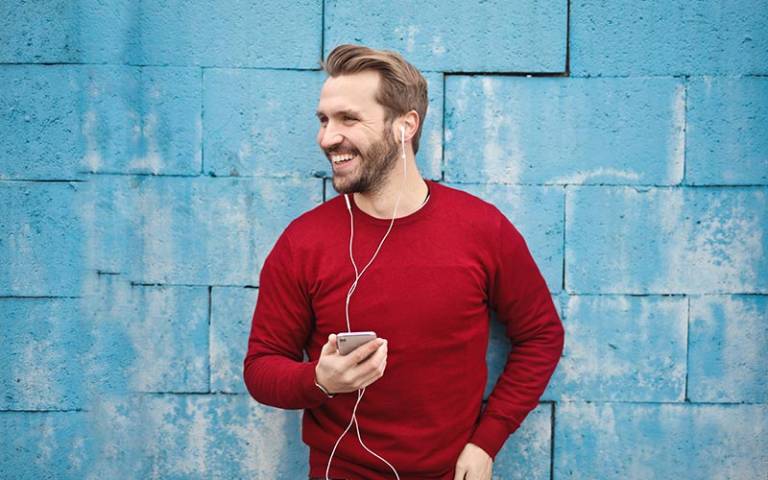Audible and UCL: Consulting on the neuroscience of narratives
How engaged are you when you listen to a story on an audiobook? Audible and Professor Joe Devlin (Vice-Dean Enterprise for Brain Sciences) worked together to find out.

17 August 2018
Setting the scene
Audible wanted to find out more about their listeners so UCL Consultants (a part of Innovation & Enterprise) introduced them to Professor Joe Devlin.
Joe was honest – a lot of that research is already available. But he also did some digging. He wrote a report listing what’s already known and what’s not. For example, how do different genres affect your brain? Or, how do emotional responses in your brain vary whether you’re listening to a story or watching it on screen? There’s some low level research already done on the latter question, but there wasn’t much known about how it actually engages you as a listener.
So Joe and his team in the Department of Experimental Psychology set off to find out how people physically respond to stories when listening to them and when watching them.
They ran experiments with roughly 100 volunteers across a large demographic. Each participant listened and watched a particularly dramatic scene that was as similar as possible in narrative in both the audio and visual versions. They were given one of eight stories: Great Expectations, Pride and Prejudice, The Silence of the Lambs, A Study in Scarlett, The Da Vinci Code, The Girl on the Train, Alien, or A Game of Thrones.
Each participant’s physiological responses were measured – their heart rate, their galvanic skin response (a measure of emotional arousal), and their body temperature – to see how emotional they got when they heard, or saw, scenes like Ned Stark losing his head, or the alien bursting out of Kane’s chest.
A surprising result
When asked about their experience of these clips, participants of Joe’s experiments said they felt they paid more attention and felt more in the story when watching it.
But, looking at the physiological data, the team found the participant’s physical reactions were completely the opposite of what they thought they were experiencing.
On average, participants’ heart rate went up by two beats a minute when listening to the audio. The results were remarkably consistent and didn’t vary by age or gender, so the chance of an error was less than 1 in 100,000.
Their body temperature also rose when listening to the audio version, and they had a stronger galvanic skin response too. All three of these are indictors that you’re doing more work, and by doing more work you’re engaging more deeply.
And the relationship grew
The success of this project has led to an ongoing relationship between UCL and Audible. There have been talks of a number of spin-off projects, including research around empathy when listening to stories through different channels.
Don Katz, Audible founder and CEO, said: “This first phase of UCL research confirms what millions of Audible listeners already know – the spoken word enthrals, entertains, inspires and, most importantly, moves us like nothing else.”
Joe Devlin said: “Trying to bridge some of the gaps between academics and industry is super exciting. The first step is recognising those gaps, and the second is being able to speak a common enough language set that you can communicate effectively in these areas. And that’s where the people in Innovation & Enterprise are invaluable.”
The story went to press on 21 June 2018, and the findings from the study can be found on bioRxiv. The research will be submitted to a peer reviewed journal in Autumn 2018.
Watch a film of Joe discussing his research
Links
Find out more about:
- the research in the preprint of research paper on bioRxiv
- UCL Consultants
- Professor Joseph Devlin
- UCL Faculty of Brain Sciences
 Close
Close

